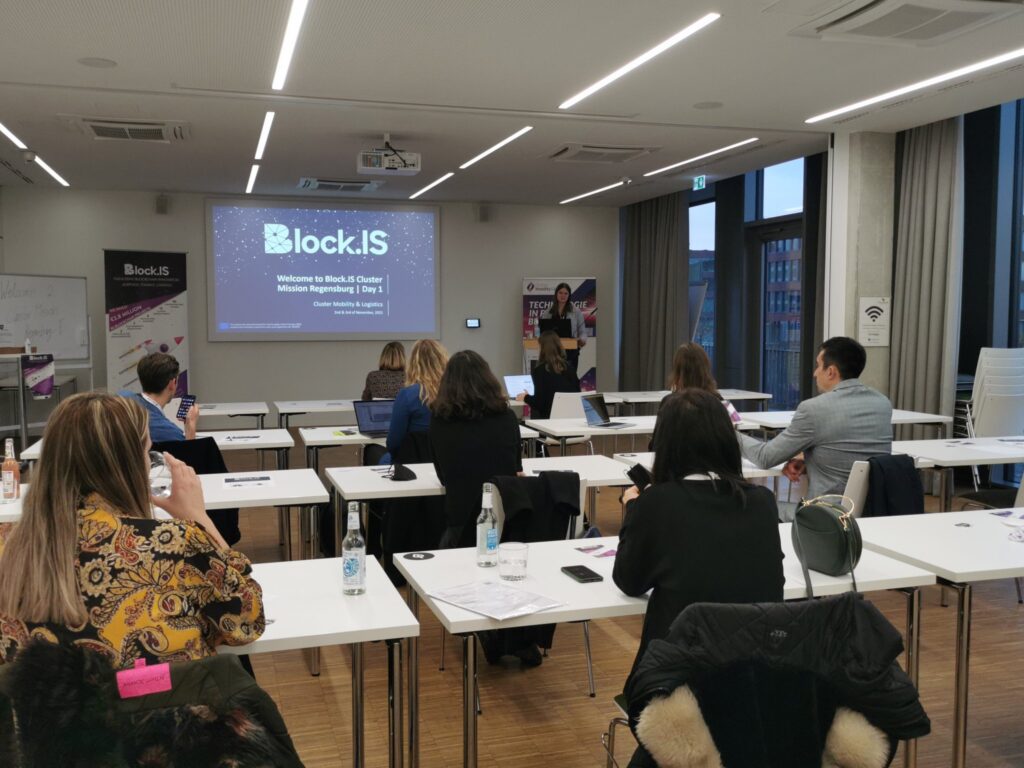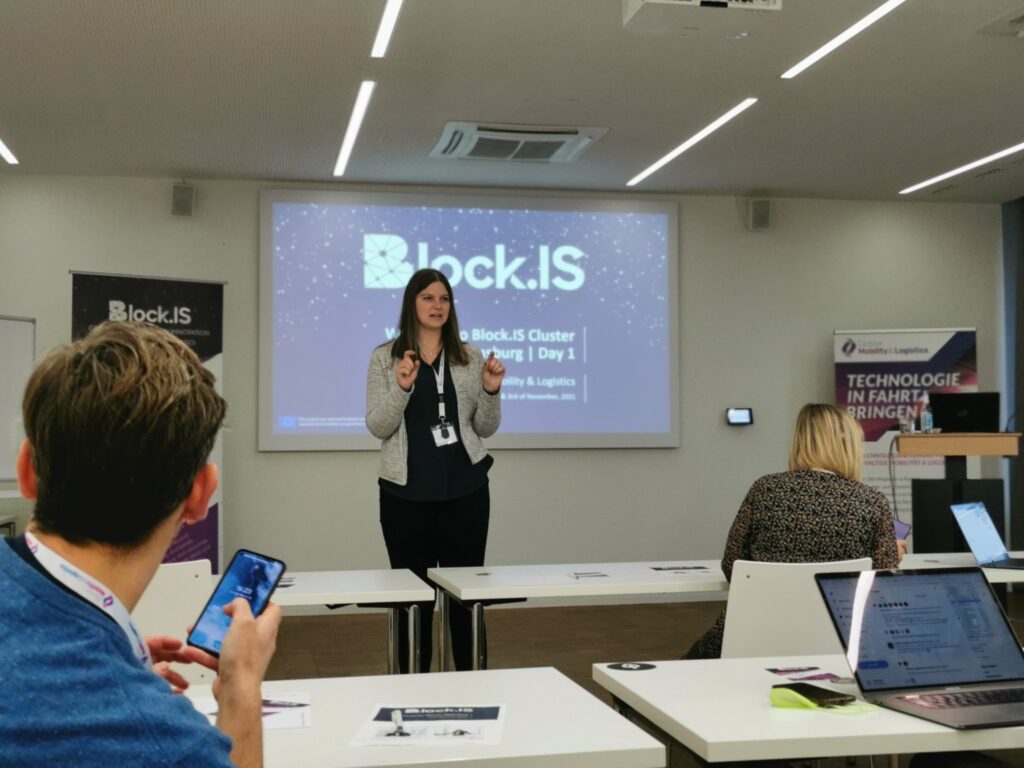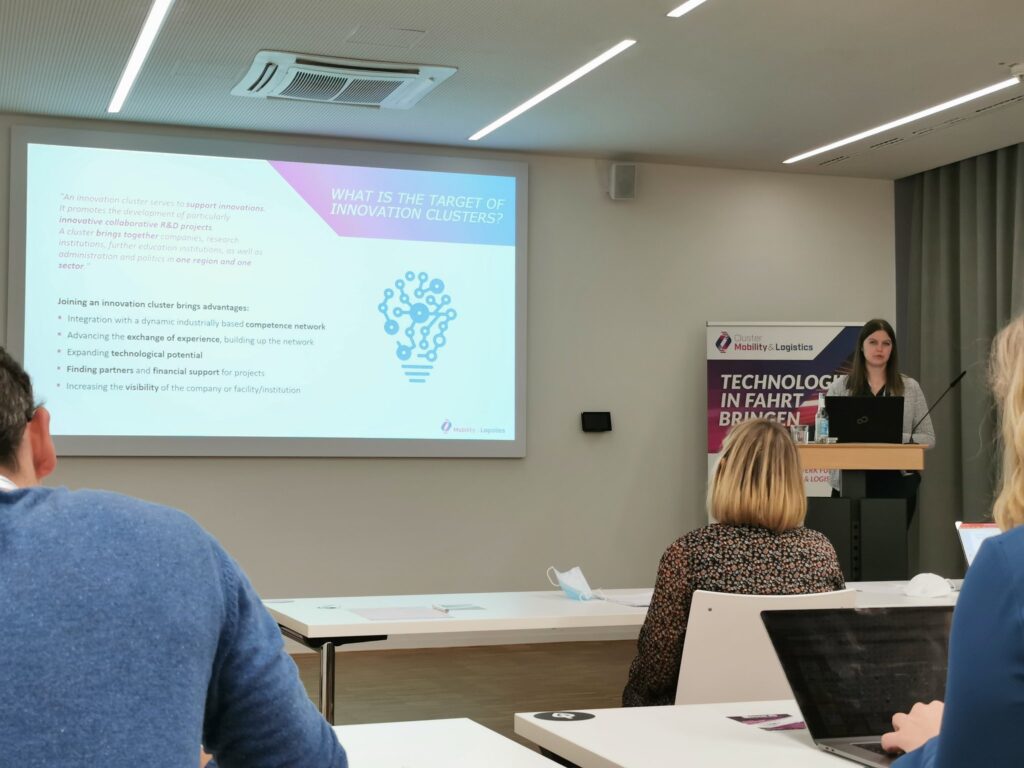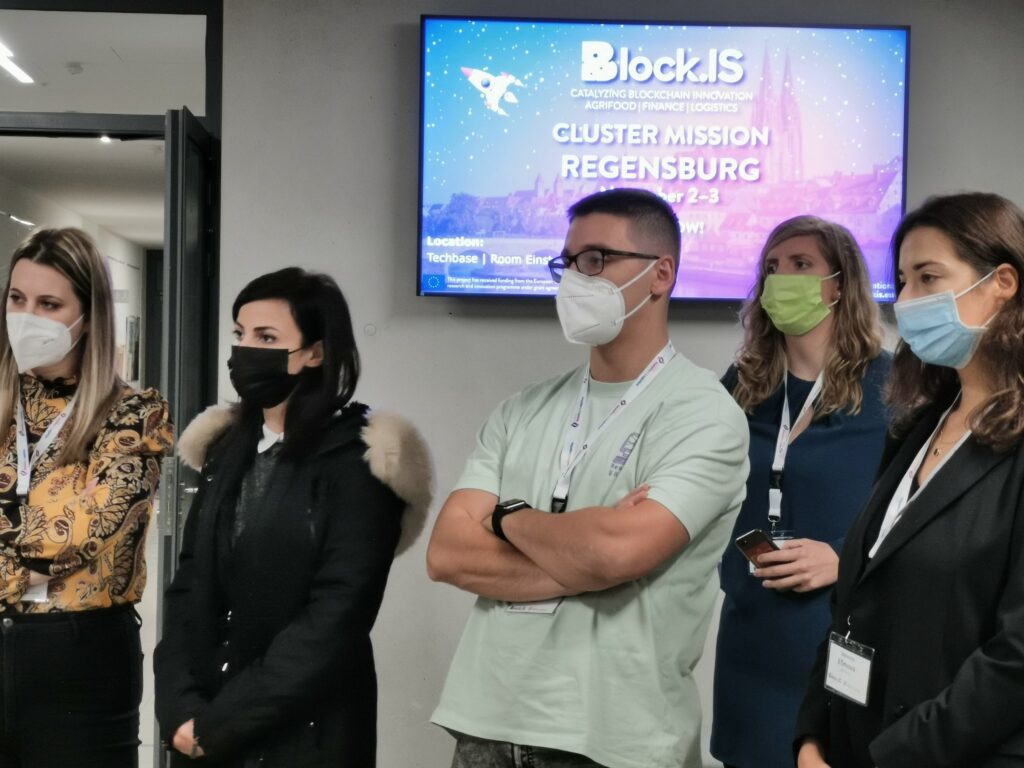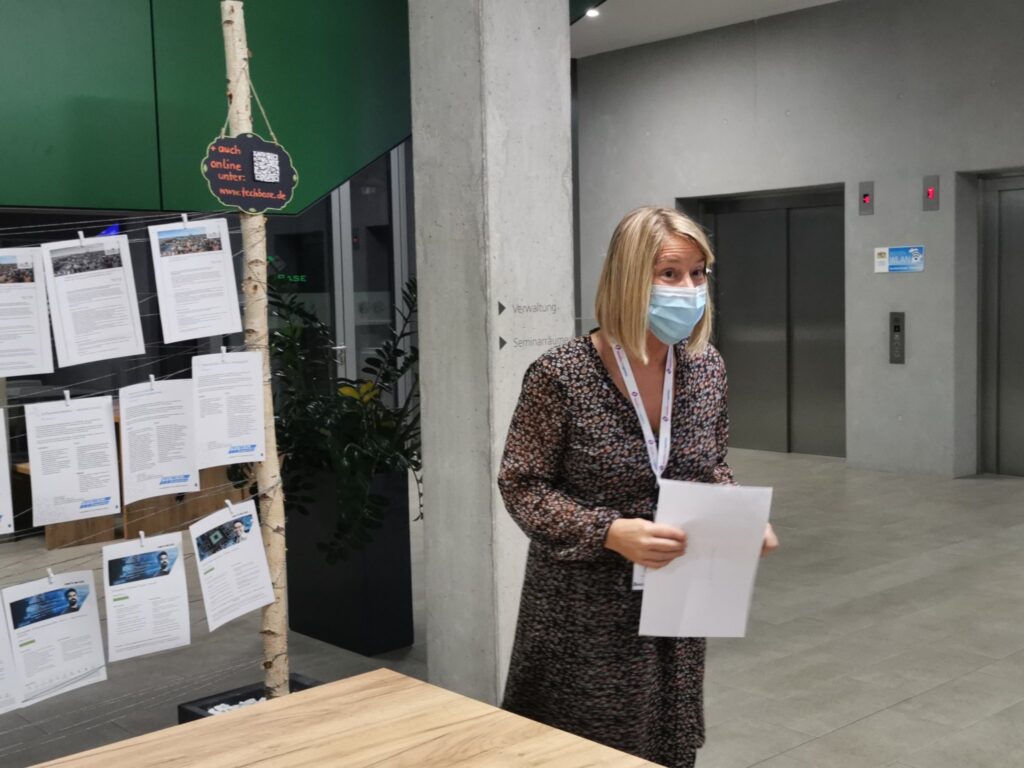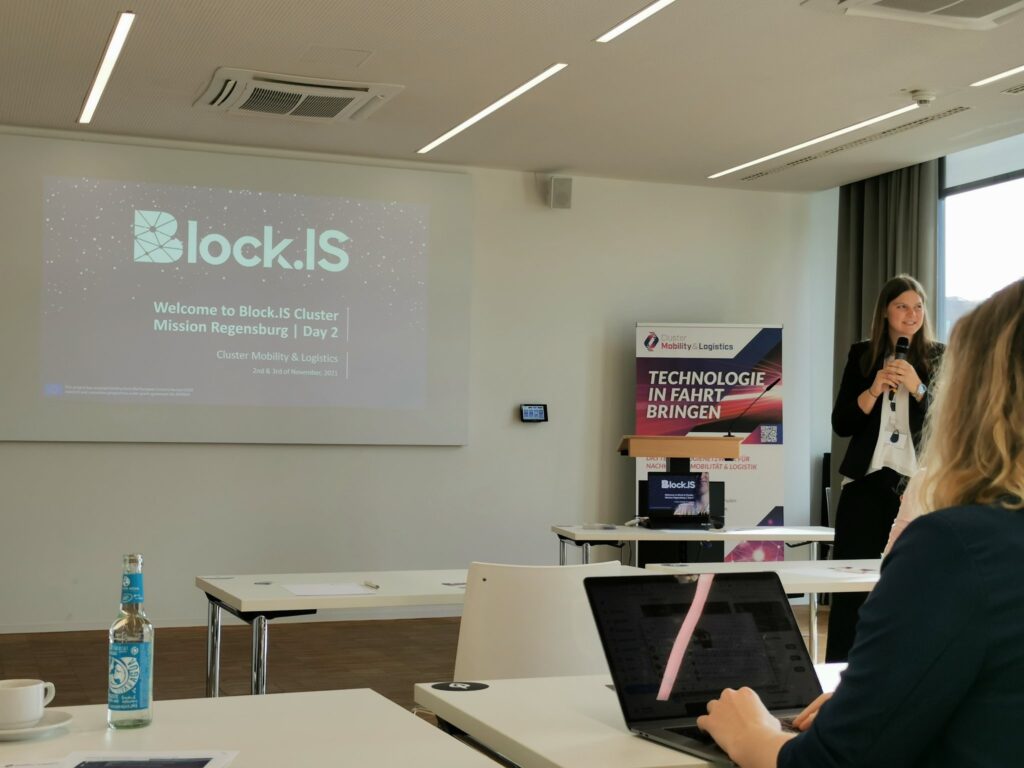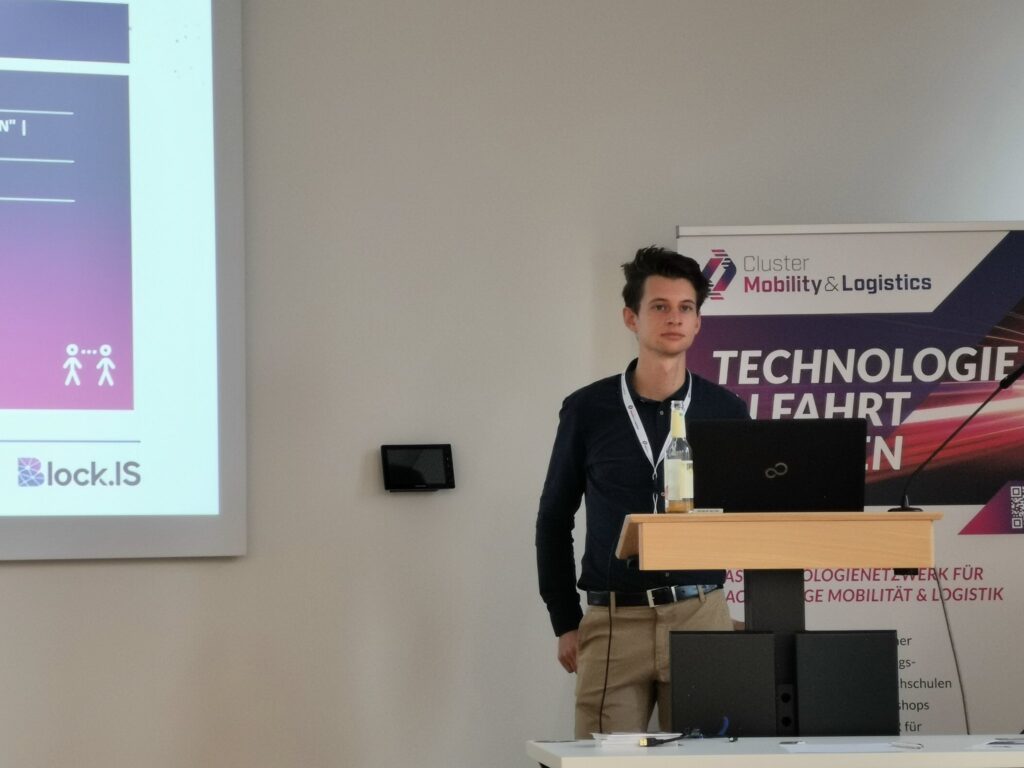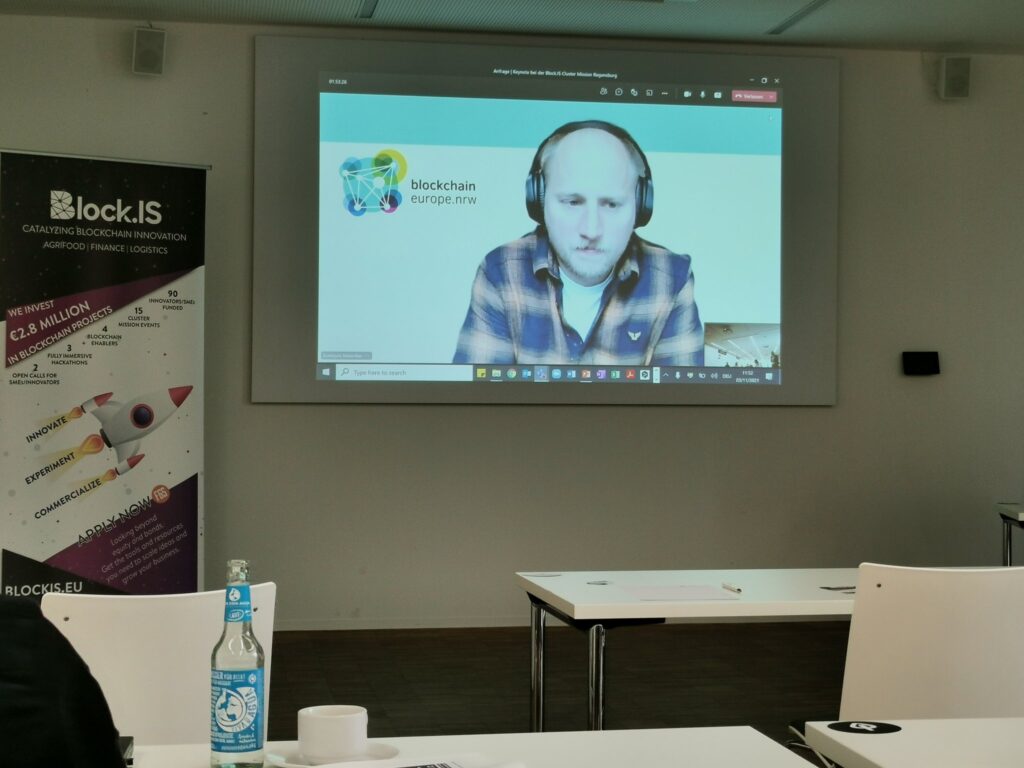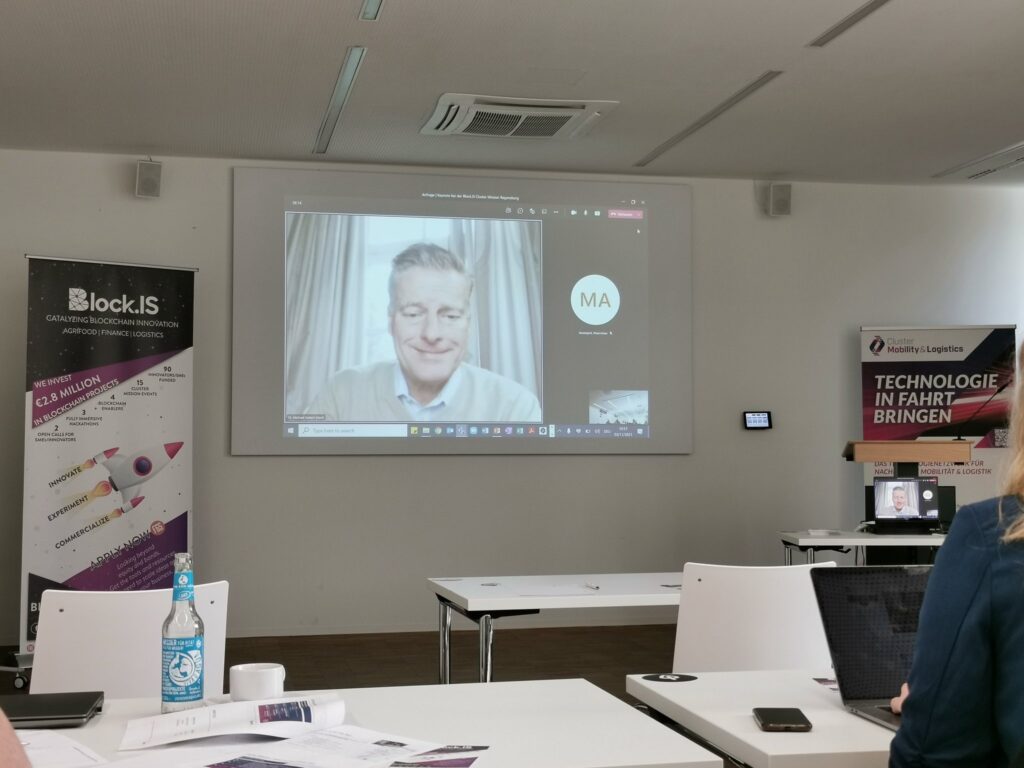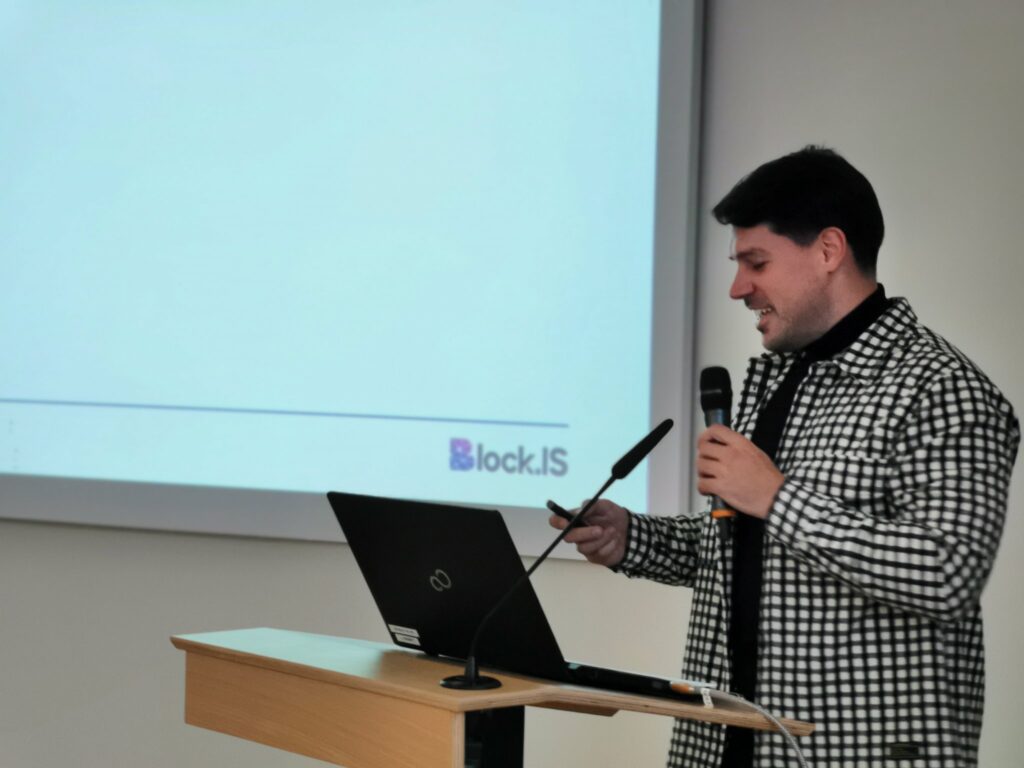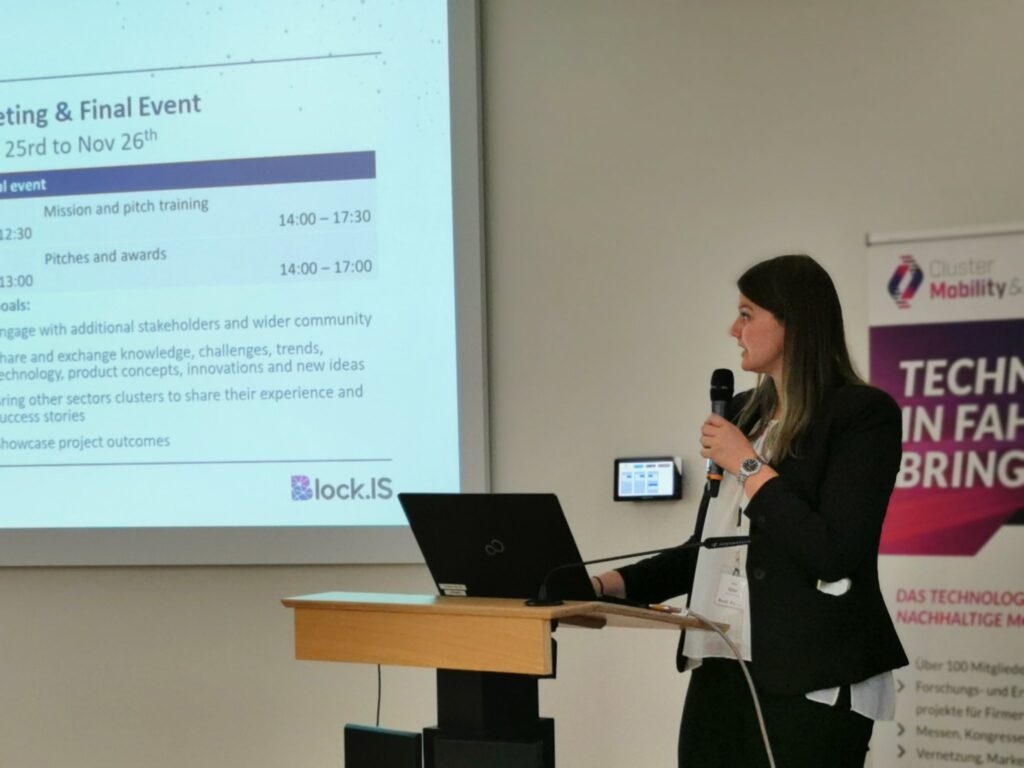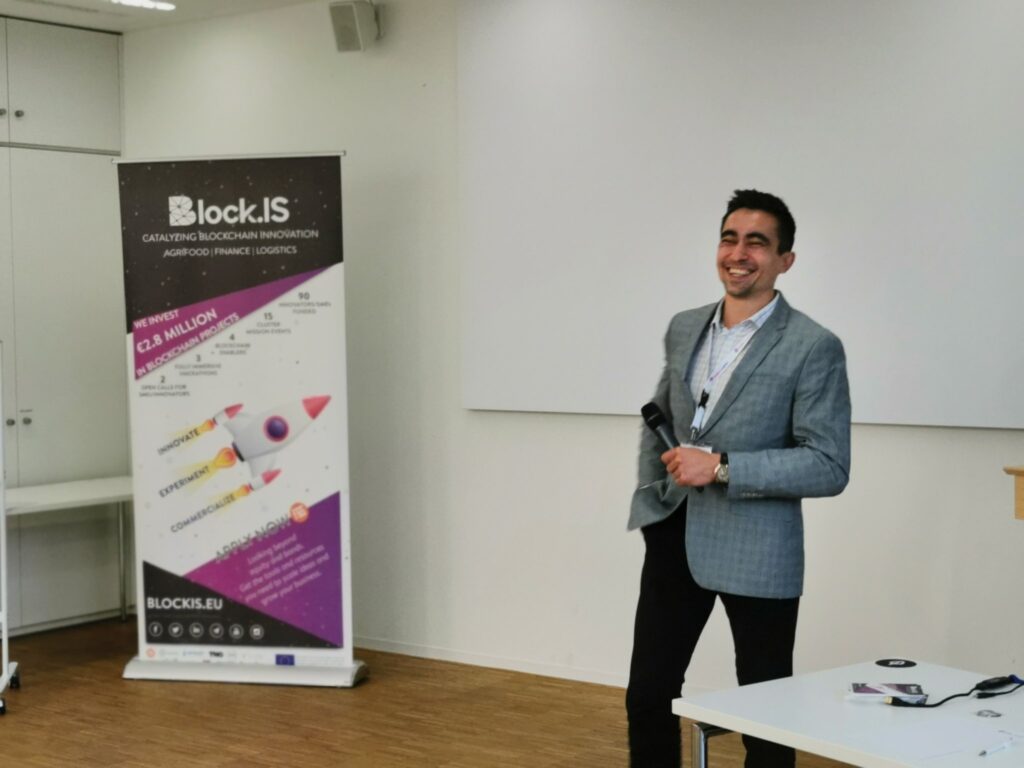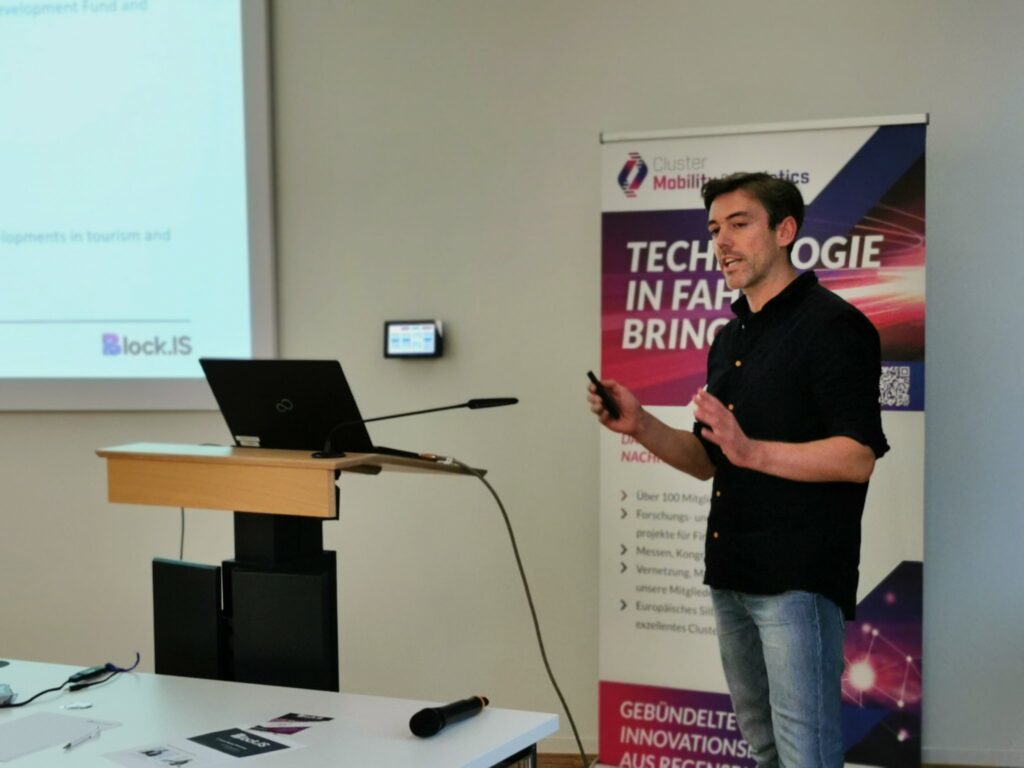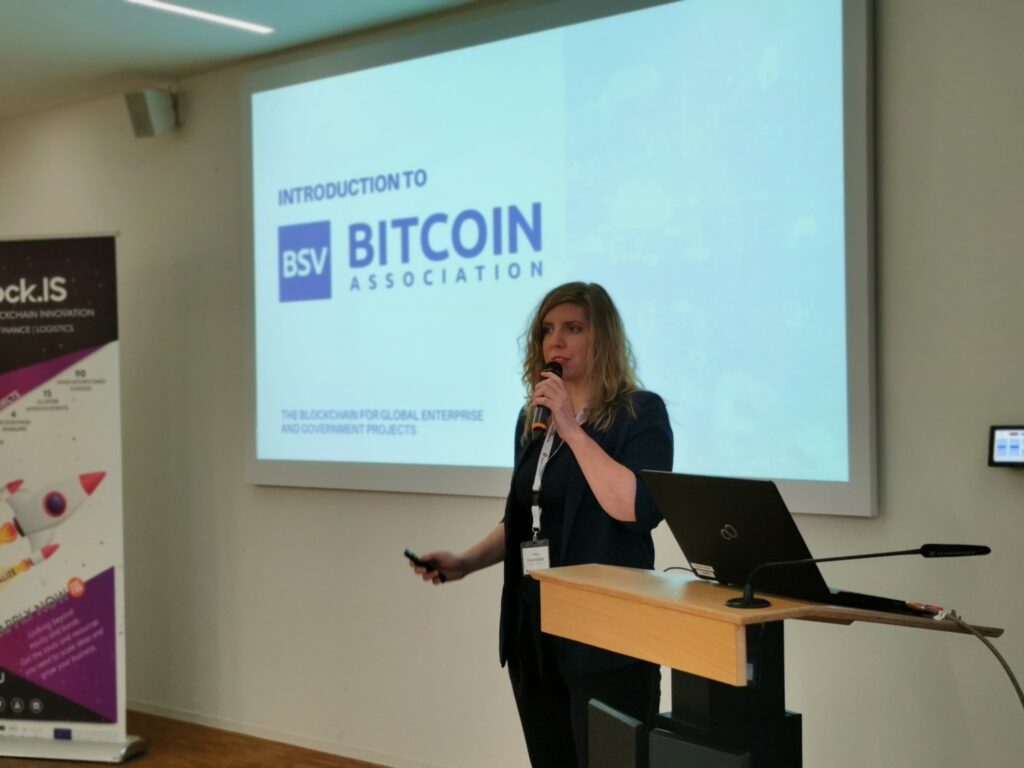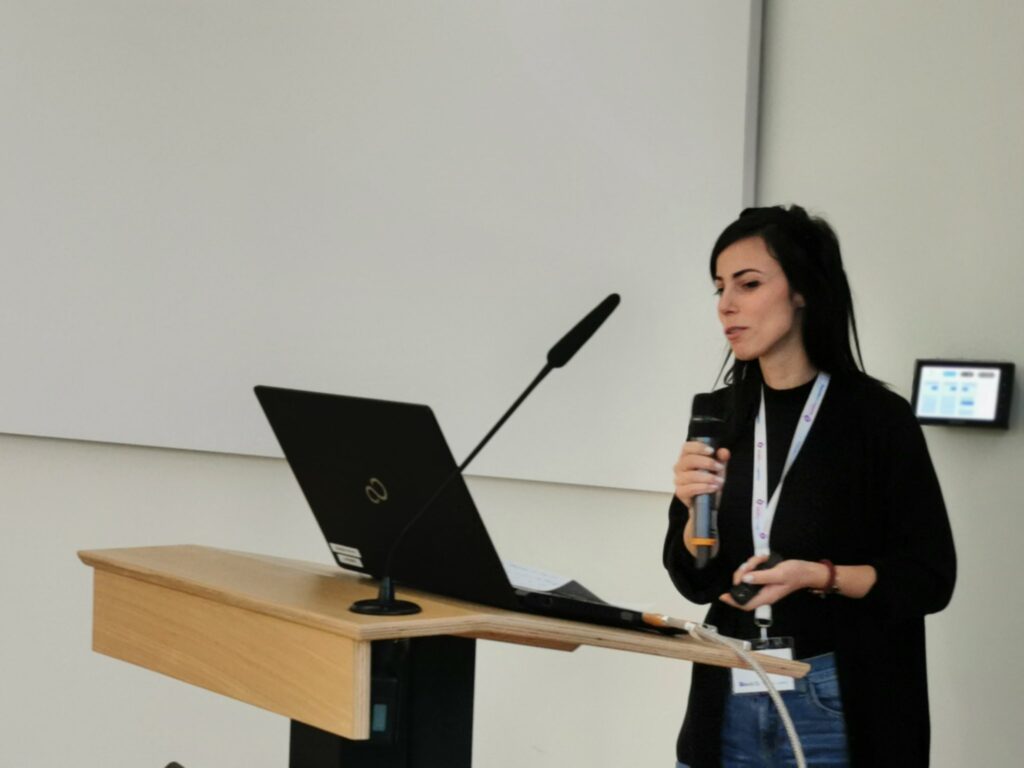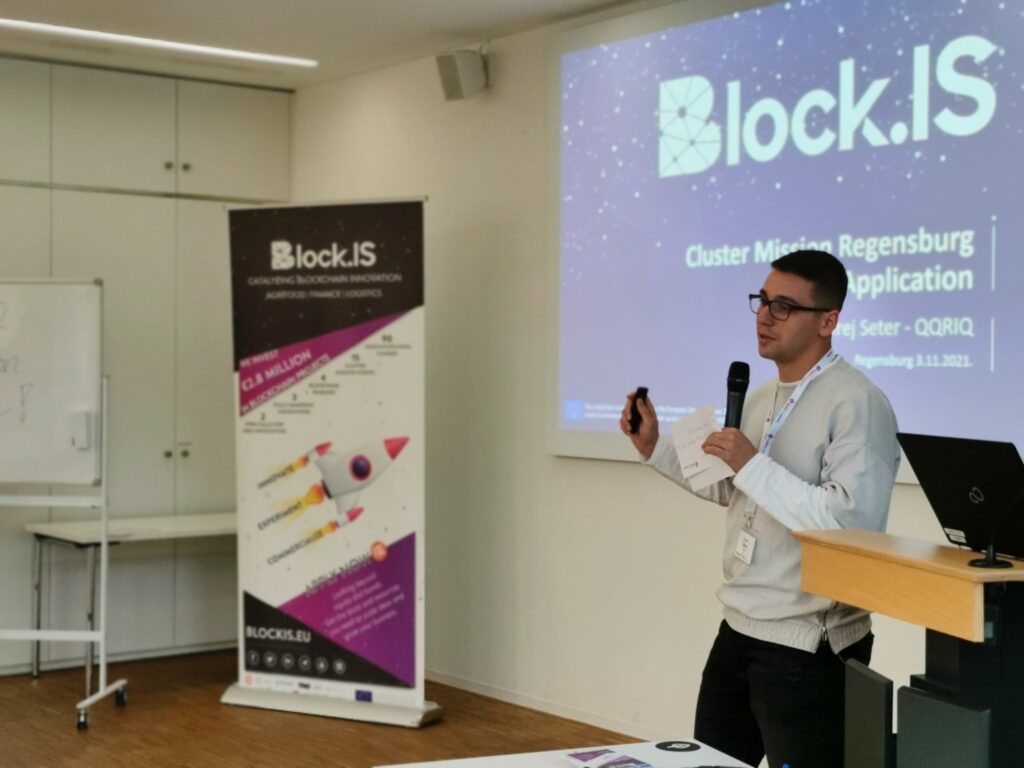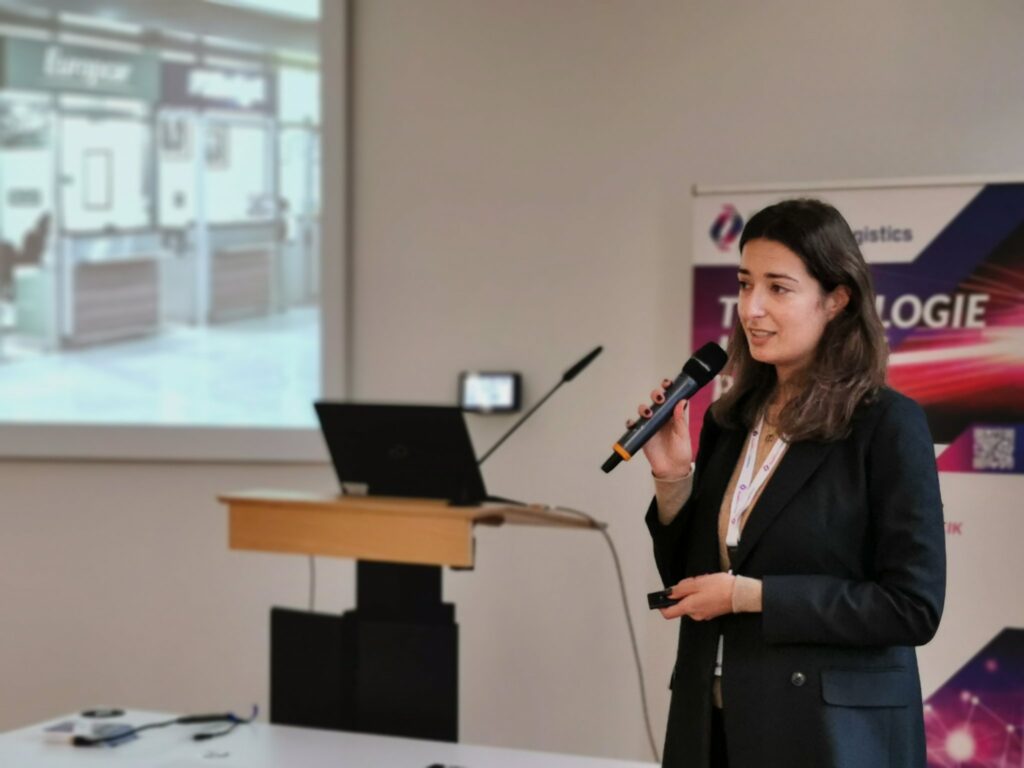Following the Cluster Missions in Milan and Valencia, the Block.IS project held its next Cluster Mission for the second time in Regensburg! Hosted by Cluster Mobility and Logistics on the 2nd and the 3rd of November, 2021, this Cluster Mission has gathered clusters and SMEs from six countries.
Block.IS Cluster Missions aim to bring clusters and blockchain SMEs together, to inspire them to learn more about Block.IS ecosystem and to understand better how they can benefit from EU funding, business and technical support.
Welcoming the participants in Regensburg’s TechBase, Anne Häner (Cluster Mobility and Logistics) has opened the Block.IS Cluster Mission Regensburg and introduced participants to the Bavarian tech ecosystem. Moreover, emphasising the power of network the links that both Cluster Mobility and Logistics and TechBase have with international companies and organisations were highlighted. Acting as a regional startup and innovation hub Cluster Mobility and Logistics as well as TechBase are providing opportunities for students, universities, innovators, startups, SMEs and international companies alike. The binding threads are innovation, sustainability, technology and harnessing the power and potential of the network.
In the same manner, the participants have had the chance to engage in the networking activities for the rest of the session, to learn more about each other’s respective organisations and possibilities to extend ties to new tech ecosystems.
The second day of the Cluster Mission was opened by Anne Häner and followed by keynote speakers. As a chairman of the European Blockchain Association (EBA), Dr. Michael Gebert spoke about “The realities of Blockchain – exploring public governance implementations in Europe”
Mr Gebert took the audience through essential factors affecting the development and implementation of innovation, particularly blockchain. Starting with the initial “hassle” of the GDPR and the current status, Mr Geber underlined GDPR’s relevance and how it is a key requirement for forming a part of EU projects and laying the base for every innovation.
Conclusion: GDPR is crucial to leverage blockchain development. Furthermore, other factors affecting its future development are the presence of blockchain in education – lack of integration in the new curriculum (formal education), as well as the political dimension and of course regulatory frameworks which are not yet fully adapted and ready for the full potential of blockchain application.
Reflecting on ongoing research, Mr Gebert introduced the audience to the topic of the new public governance, and how blockchain is altering the relationship between public administration and non-public actors, as well as the role of the EU institutions. This part of the session was concluded with a lively discussion encompassing the topics from the possibilities to join the European Blockchain Association to the more specific legal matters and challenges on national levels, the influence and possibilities of the EU institutions as well as organizations acting as carriers of blockchain implementation.
Blockchain empowers people, movements and industry!

Second keynote speaker, Dr Maximilian Austerjost, Project Manager at Fraunfoher IML & Blockchain Europe) tackled supply and chain management and ongoing projects through the topic “Open source and blockchain as drivers of sustainability”. Starting off with the current projects and product development (hardware developed for transport process – food and medical supplies as well as dangerous goods) and interlinking them with the Sustainable Development Goals and initiatives for Circular Economy, Dr Austerjost has explained in depth how economic survival of companies is tightly related to sustainability and innovation-driven by taking into account primarily social and environmental factors. Savings and concrete contributions to sustainability made with the introduction of blockchain technology are significant.
Blockchain has the potential to form a digital backbone of the sustainability – it needs to be known and used consciously by companies. One solution lies in Open Source!

Current challenges encompass the fundamental understanding of the circular economy, traceability and control of material return, digitization and financing options as well as the establishment of corresponding business models. The digital product passport could act as a mitigation measure to these challenges of the circular economy. Additionally, the participants had the chance to learn about German legislation tackling due diligence, and prevention of human rights violations in supply chains (colloquially known as Supply Chain Act) as well as Sustainable Finance which is facing challenges such as central platforms and double counting. Tokens could act as digital certificates proving blockchain yet again as a powerful tool to increase and solve sustainability concerns. Lastly, Mr Austerjost highlighted the main advantages of Open Source software usage – among them cost savings, it-security, interoperability and facilitation of cooperation and innovation. The session was concluded with the discussions on protection and implications of the digital identity (DIDs) and what kind of blockchain technology is used as well as the frameworks to evaluate how green the use of blockchain technology really is and how it contributes to a circular economy.
The third keynote speaker was Mr Benedikt Putz, Chair of Information Systems at the University of Regensburg. “Blockchain in agrifood and logistics: challenges on the road to production” was the topic of Mr Putz’s keynote speech, highlighting the successful use cases, domains of operation and challenges. Most importantly, the agri-food problems that blockchain can help solve were discussed. Top priorities are the food quality and safety and additional benefits of the technology auditability, supply chain efficiency and finance matters (faster payments and simplified trade finance transactions). Among the use-cases, the most prominent is IBM Food Trust, EZ Lab (also a former participant in the Block.IS Acceleration Programme) and ConsenSource.
It’s not all sunshine and roses — there is just not enough companies to quickly develop solutions and this has to change.

STARTUPS & CLUSTERS Presentations
Inspired by the talks of innovation and the importance of building the ecosystem, the first to open the pitching session was the Union of Young Entrepreneurs of Montenegro acting as a cluster and a hub, currently gathering 150+ members and more than 100 companies directly supporting its businesses and work. Entrepreneurial mindset, resourcefulness and high-impact regional network are the main highlights and reasons to establish a collaboration with this Montenegrian cluster.
As a well-versed Block.IS participant, Volvero made a comeback presenting its application and current challenges in both insurance and blockchain. Showcasing how one company can really be boosted by projects such as Block.IS – from the idea, early development and the start of their participation in the project during 2020, Volvero has now emerged as a serious competition and company with a significant impact on the transportation and car-sharing industry. Learn more about their merging with DriveBuddy and new plans here!
QQRIQ is another representative from Montenegro. IT, Real Estate, Sport, Gaming and design for the first Montenegrin NFT project, are at the heart of the core activities. Next in line was the Blek Studio, a fresh architectural company, part of the Young Entrepreneurs of Montenegro and real-estate cluster aspiring to implement blockchain in their day-to-day business connecting real-estate and investments. Collaborating with Blek Studio, Nord Pixels presented shedding the light on the importance of innovation in the living and lighting systems and the projects they are currently developing. Coupling the efforts of NordPixels, BlekStudio and QQRIQ will result in the web platform group enabling access to their respective services but also providing a unique site for information on investing (for both domestic and external investors), enabling the machine-learning collection of data and usage of respective services and relying on blockchain for data safety, transparency and trust-building with future clients.
FORSTUM has opened up a new avenue of blockchain application by creating a marketplace of forest investment opportunities. A bio-digital asset is the “tokenized” tree and the actual plantations are in Romania at the moment. FORSTUM offers various tree types, NFT format, insurance and maintenance of all the services connected to the trees – which are bought as a service through their entire lifecycle!
Bitcoin Association was presented by its German ambassador and CCO of Smart Ledger Meike Krautscheid. It is a global industry organisation and cluster that works to advance business on the BSV blockchain, proactively engages with the regulators but also brings together enterprises, start-up ventures, developers, merchants, exchanges, service providers, blockchain transaction processors (miners), and others in the Bitcoin SV ecosystem. They are one of the carriers of the transition to Industry 5.0!
One of the challengers from the Block.IS Innovation Challenges, the Tourism Cluster Brandenburg has provided insights on developing a tourism information software and app within the destination of Brandenburg while keeping an eye on travel, tech and other new trends ensuring a widespread application of their services. In the context of blockchain, they have posed a challenge on the topic of Digital Payments and improving the way that the payments bundle various services used by tourists during their stay in certain regions.
Concluding the pitching session, a member of the ENRIGA cluster – SIA Sabotage Promotion, operating in FMCG sector presented their cluster and companies, showcasing the work with international brands and how they position in the tech and marketing ecosystem.
Next Steps
After the three successful Block.IS Cluster Missions, the next one takes place in Brussels! Gathering the best innovators from the blockchain ecosystem in a Final Event for both Cluster Mission and Innovation Challenges representatives will take place on the 25th and 26th of November. Click on the links to check out how you can apply and what additional programmes and cross-collaborations to expect!

